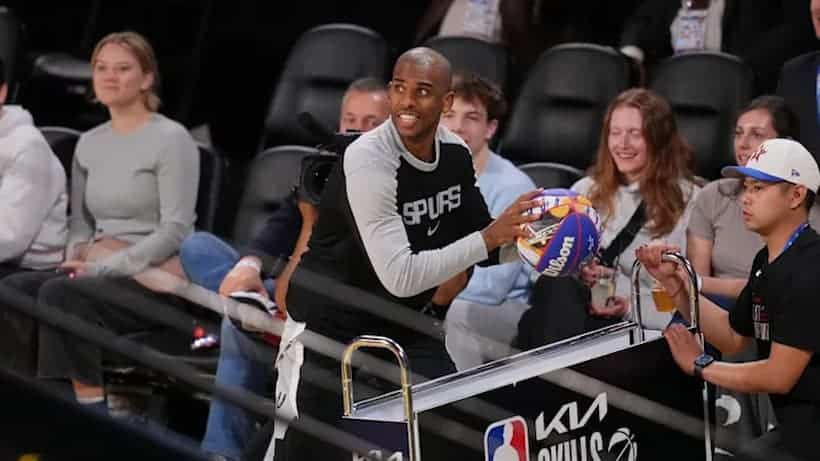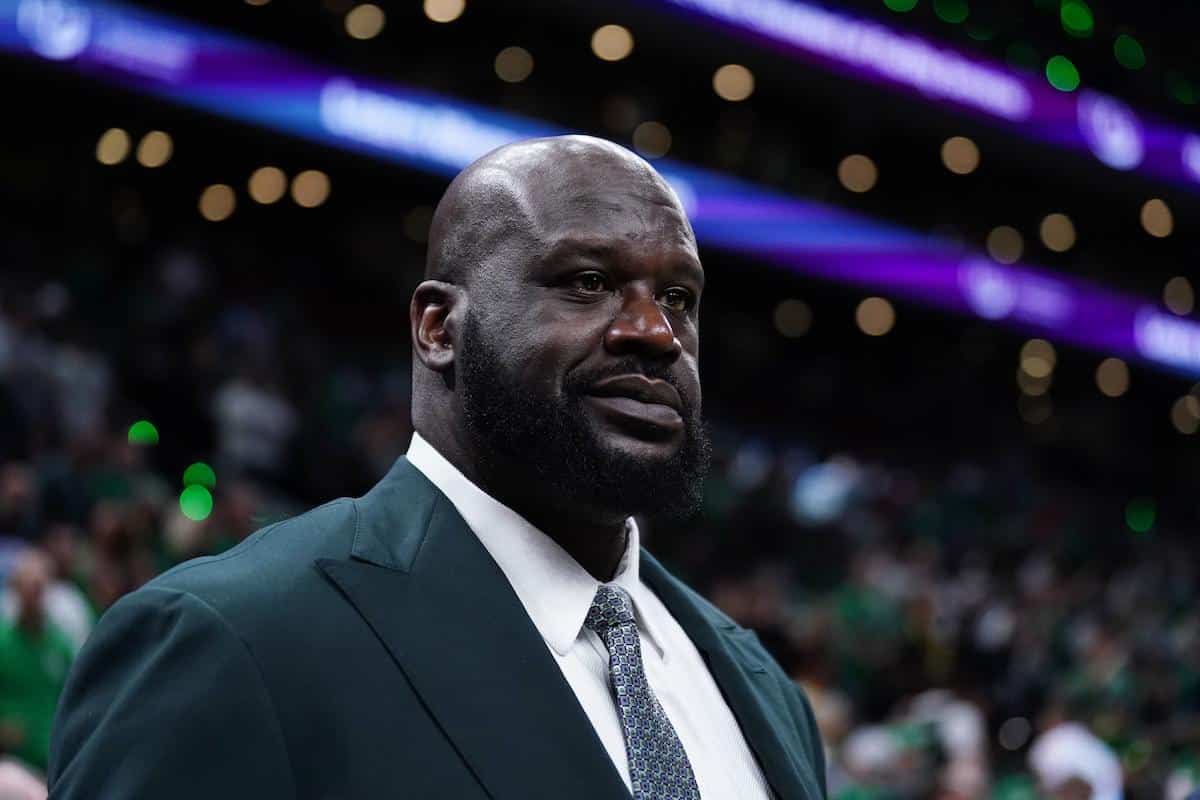Standing at the top of Powder Mountain in Utah on a Tuesday afternoon in mid-March, Joakim Noah is calling in for our scheduled Zoom interview while on a family vacation with his kids during spring break. You can see the ski goggles resting on his forehead, as he adjusts the phone in front of him while the sun beams in the background. He’ll only have his camera on for a little while before he opts to go off-camera, as he finds himself on the move. He’s so gracious that he happily puts his family vacation on hold for a few minutes just to hop on a call with us, as we rushed to send our latest issue to printers.
Even when he turns his camera off, and despite being in the middle of a vacation, you can hear the passion in Noah’s voice when he begins to excitedly talk about the different community initiatives he’s currently working on, whether in Chicago or in Africa. It’s been years since he’s hooped on an NBA court, but the enthusiasm the former NBA All-Star and Defensive Player of the Year was always known for remains intact.
SLAM: Are there any new passions or hobbies that you’ve found during retirement that maybe you did not discover during your playing years, or just didn’t have the time to dedicate to while in the NBA?
Joakim Noah: Well, I’m not gonna lie to you, I’m on the top of a mountain right now overlooking—I’m on a ski slope right now. I just did three hours of skiing with my kids. My nephew just came for the first time from Maui. It’s his first time seeing snow. When you’re playing basketball in the NBA, you’re not allowed to do things like [skiing]. You don’t want to put yourself in a position to get hurt. So, I’ve been picking up skiing, that’s a good one. And just being able to travel and take time and not being rushed into getting back in playing shape. It’s a different kind of training. [Now] you train for health. Training for health and training for championships are two completely different things. I think that my nervous system appreciates it.
SLAM: Where’s your skiing skill level?
JN: Skill level, I would say I’m not comfortable going down heavy duty stuff. I’m not going down any black slopes. Or even blue slopes. I’m very comfortable staying in the green. You know, that’s seven feet, 260 pounds going down the slope. That’s a different animal.
SLAM: What new business endeavors have you been getting into?
JN: Being able to be an investor in the NBA Africa league, the BAL, has been a real blessing, because I’ve been able to travel all around the continent and just really learn from the best in the business with [President of the Basketball Africa League] Amadou Gallo Fall and [NBA Deputy Commissioner] Mark Tatum. You know, taking a leadership role in NBA Africa, and just really starting from scratch on the continent, and just watching this league flourish. We just came back from South Africa. It was packed, it’s a different energy. And we’re just getting started on something that I’m really excited about.
SLAM: What is your ultimate goal with the BAL? Where do you see it in 10 years?
JN: My ultimate goal is when you see African kids, like, doing a tween-tween hesi, then you know that we did something right. You haven’t really seen the African kids do the hesi-hesi yet, and that’s coming!

SLAM: It sounds like there’s a lot of untapped basketball potential in Africa, plus also a business model structure to enable the league to flourish.
JN: There’s definitely a business model structure. But the continent is 54 different countries and the fastest growing youth population in the world. So, the math adds up. But it’s also understanding that when you’re playing in systems in America, you get to play in a beautiful gym, you have your school’s high school rival, you have your little girlfriend that’s coming to watch you play, mom and dad are coming to watch you play. Like, these are all things that places around the world don’t have. So, the problem with Africa is the lack of—this isn’t a sport that’s part of African culture. So, it’s really starting from scratch. And understanding that the issues are lack of infrastructure and lack of basketball education, even when it comes to refereeing, when it comes to coaching.
A lot of people are putting in the time and making long trips and teaching, [running] basketball and coaching clinics, clinics for the referees. Just to see how far the growth has come in the last five years is just astounding, but we still have a lot of work to do.
SLAM: How did you end up connecting with the BAL?
JN: I think, for me, it was having a relationship with the president of the BAL, Amadou Gallo Fall, who was a dear friend of mine throughout my career. Even though he was the guy who was a scout for the Dallas Mavericks, [and] I never played with the Mavericks, [he] was just somebody that I always connected with. And I think that that’s something that I realize now that I’m done playing. You realize that when basketball is over with, all you have in the end is just your relationships and your memories. So, I think that’s just important to sometimes [remember], there’s so much money involved, and it’s so easy to get caught up in the business. Just make sure that you go out on your terms, and that you make solid, solid relationships and solid bonds.
SLAM: Are there some non-basketball endeavors that you’re into that you might want to put on people’s radars?
JN: I think that most of the work that I’m doing right now is basketball-oriented. The other endeavor that I’m really excited about is this One City Basketball League that we created in Chicago. We’re working with 28 violence prevention groups all around the city and having at-risk youth playing basketball against each other, getting state funding and being able to build a basketball league that’s much bigger than basketball. We have financial literacy courses, job education, job training, and all this. Things are moving fast. I’m really excited with the development of our One City Basketball League. We’re doing special things. We’re really hoping to be able to grow it in other cities, and hopefully other guys around the League get inspired and want to do things in their neighborhoods. I really feel like the future of this league can be a national program. I think that’s very important in our communities in America.

SLAM: You mentioned fatherhood earlier. How has fatherhood changed you as a person after retirement? What is Joakim Noah, the father, like these days and what have you learned from your kids?
JN: It’s teaching me that it’s not about me, ever, especially when the kids are around you. When you’re playing, sometimes you feel like it’s about you, and the lights are on you. But my kids, I can be watching my favorite show on TV, and they’ll turn that right off [and] put on Moana. They don’t care.
SLAM: What do you think about the current state of basketball? What are some trends or things you like about the game today? And what are some things that you feel could be improved upon?
JN: Well, I think that the game is definitely more skilled. I think one through 15, even the guys who are just coming into the game, are just so good at basketball. I think that, obviously, the spacing is different. A lot of people are putting an emphasis on [saying that] there’s no defense and stuff like that, but I don’t think it’s the players’ fault. I think it’s just the way that the game is ref’d, the way that the game is, it’s completely different. They’re not letting you have any contact with guys. The game is a lot softer because that’s just the way the game is called. It’s just less physical. And I think it’s just putting a lot of pressure on the defense when you can’t use your hands, these are all things that were part of the game even 10 years ago that they’re not letting guys do anymore. So, I don’t think it’s a question of guys not wanting to play defense. I think it’s just the way it is officiated.
SLAM: Is there one thing you didn’t get a chance to do or try, or maybe you just were
apprehensive about, during your playing days that you look back on now and regret not doing?
JN: I think that my mind would say that I wish that I had developed a three-point shot. I think that would have definitely helped. But, you know, at the time, I was a rolling big—you set screens and you roll, and that was my role. That’s just the way the game was played. And what I tell the young guys all the time is, it’s about being as effective as possible and trying to affect winning. And when your mindset is trying to score points for yourself, I think that takes away from the ultimate goal, which is to win the ball game. I don’t really talk about Xs and Os too much, I don’t talk about technique, because that was never my strength. My strength was always being as available as possible for my teammates and being a good teammate, and doing whatever it takes to help win a basketball game.
Photo via Getty Images.






